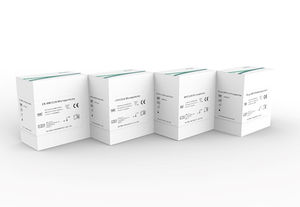
- Laboratory
- Laboratory medicine
- Cardiovascular disease test kit
- Autobio Diagnostics
Hypertension test kit CMD0402for cortisolleadclinical
Add to favorites
Compare this product
Characteristics
- Applications
- for hypertension
- Tested parameter
- for cortisol, lead
- Sample type
- clinical, blood
- Sample volume
0.025 ml, 0.1 ml
(0.00085 US fl oz, 0.00338 US fl oz)
Description
Hypertension, also known as high blood pressure, is the condition in which the pressure value of flowing blood in the vessel against the blood vessel wall is constantly higher than normal. Hypertension is often called a "silent killer", because in most patients it can have a sudden onset without any previous signs. When the blood vessel burdens pathologically high blood pressure for a long time, it can lead to severe diseases like coronary heart disease and stroke.
The combinational hypertension assessment is composed of two systems: Renin- angiotensin-aldosterone (RAAS) system: Renin, angiotensin II (AII), aldosterone (Ald) and Hypothalamo-pituitary-adrenal cortex (HPA) axis: adrenocorticotropic hormone (ACTH), cortisol.
Clinical Significance
The panel is commonly used in the type determination of hypertension, and monitoring of the scientific medication and treatment effectiveness of hypertension patients. The assessment results can provide instructions on the proper medication for primary hypertension and allow the monitoring of treatment effectiveness, and can also be used to effectively distinguish cases of primary and secondary hypertension.Therefore, the assessment can provide scientific references for physicians to formulate reasonable antihypertensive plans for the majority of patients, evaluate the effectiveness of antihypertensive drugs currently used by the patients, and also screen out cases of secondary hypertension that are not easily detectable.
Clinical significance
Renin concentration
1. Auxiliary diagnosis of rénal artery stenosis-induced hypertension
2. Auxiliary diagnosis of renovascular hypertension
Catalogs
No catalogs are available for this product.
See all of Autobio Diagnostics‘s catalogsRelated Searches
- Autobio Diagnostics test kit
- Solution reagent kit
- Autobio Diagnostics blood test kit
- Autobio Diagnostics serum test kit
- Plasma assay kit
- Infectious disease detection kit
- Diagnostic reagent kit
- Respiratory infection test kit
- Autobio Diagnostics clinical test kit
- COVID-19 detection kit
- Clinical chemistry analyzer
- Bacteria reagent kit
- Antigen assay kit
- Clinical reagent kit
- IgG test kit
- Automatic clinical chemistry analyzer
- Benchtop clinical chemistry analyzer
- Laboratory detection kit
- Autobio Diagnostics cell test kit
- Autobio Diagnostics cancer test kit
*Prices are pre-tax. They exclude delivery charges and customs duties and do not include additional charges for installation or activation options. Prices are indicative only and may vary by country, with changes to the cost of raw materials and exchange rates.


